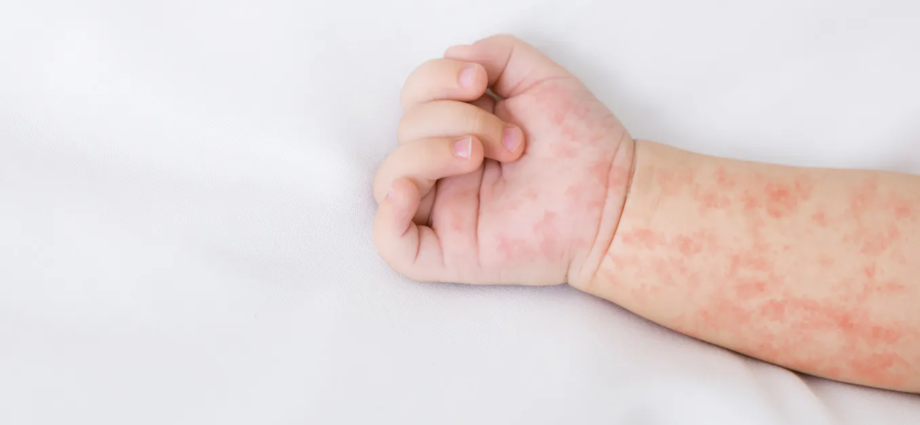
Kirsten Fiest, University of Calgary; James Talbot, University of Alberta, and Jason Cabaj, University of Calgary
April 29, 2024
Recent surges in measles cases globally underscore the urgent need for heightened vigilance and action to combat the resurgence of this highly contagious and potentially deadly disease.
While Canada has made significant strides in measles control, declining vaccination rates and increasing vaccine hesitancy pose a concerning threat to the health of the public.
Measles, once on the brink of eradication, has resurged, exacerbated by the disruptions caused by the COVID-19 pandemic interfering with routine vaccination programs. The World Health Organization (WHO) reported a staggering 79 per cent increase in global measles cases in 2023 compared to the previous year. Europe alone reported 40 times the number of cases (2023 over 2022), highlighting the pressing need for sustained efforts to maintain high vaccination coverage.
There were zero cases of measles in 2021 in Canada. Following the global trend, we are seeing increasing measles cases in Canada in 2024. As of April 13, 60 cases had been reported in four Canadian provinces. Since then, Alberta has became the fifth province to report measles this year with a case confirmed on April 24. Most cases are in unvaccinated children, but adult cases have been reported.
Measles is so highly contagious that simply being in a room where someone with measles has been within the past two hours is enough to risk transmission, and infected people can transmit the virus four days before the rash appears. The reproduction number (R0) of measles is 12-18, meaning that one person with measles will infect between 12 and 18 others. For context, the R0 of COVID-19 is between two and four.

Practically, this means that up to 90 per cent of the unimmunized can develop the disease after exposure to an infectious case. Measles can infect anyone but is most common in children.
Tragically, measles also has one of the highest death rates of all vaccine-preventable diseases. One to three cases in 1,000 unimmunized individuals will die, one in 1,000 will be brain damaged and some will experience permanent deafness or blindness.
Vaccines provide life-saving protection
Vaccines, such as the MMR (measles, mumps, rubella) vaccine, have proven highly effective in preventing measles infections, with two doses providing up to 97 per cent protection. However, vaccine hesitancy and misinformation have fueled the resurgence of measles, placing unvaccinated individuals, particularly infants and young children, at heightened risk of infection and its severe complications.
There is also a global need to reinvest in the public health-care system, particularly the recruitment and retention of public health personnel lost during COVID, including those involved in immunization and outbreak detection and control.
The measles vaccine is extremely safe, with more than 60 years of evidence proving its effectiveness and safety. The evidence includes multiple studies confirming no link to autism. For those relying on evidence-based public health decision-making, this is one of the safest preventative measures we possess.
The ongoing pertussis (whooping cough) outbreak in Alberta further underscores the importance of vaccination in preventing communicable diseases. With vaccination rates dropping across the province and outbreaks occurring, public health efforts must focus on renewing the public health infrastructure and promoting vaccine acceptance and accessibility.
People most at risk for pertussis are those who are unvaccinated, and almost all deaths occur in children under the age of one. Between November 2021 and Feb. 21, 2024 there have been 966 lab-confirmed cases of pertussis, with 78 of those cases confirmed between Jan. 1 and Feb. 21, 2024.
Vaccination rates vary significantly across the province but are 20-35 per cent below the optimum to prevent epidemic spread, with less than 60 per cent of the population vaccinated in some communities.
Protecting communities
As public health physicians and researchers, we emphasize the critical importance of vaccination in protecting individuals and communities from preventable diseases like measles and pertussis. We urge people to ensure they and their families are up-to-date with vaccinations, following recommended vaccination schedules to safeguard against measles, pertussis and other vaccine-preventable diseases.
Given the worldwide resurgence of measles, it is also imperative that travellers (particularly those with infants and small children but including adults) are up to date on their immunizations six to eight weeks before travel.
Common guidance says those born before 1970 do not require measles vaccination because they were alive when measles circulated widely, and likely have immunity from infection. If you were born after 1970, and do not know if you had two vaccines, calling 811 (where available) can advise on the proper course of action to ensure you are fully protected.
There are four doses in the primary series of pertussis vaccination, a booster at school entry, and a further booster in grade nine. One booster should be provided for all adults (about every 10 years) and pregnant women during each pregnancy.
If you, or someone in your family, has symptoms of measles, stay home and call health information services (811 for example) before visiting any health-care facility or provider.
In light of the recent resurgence of measles and pertussis, it’s imperative to protect the well-being of our communities. The most effective way to prevent the return and spread of vaccine-preventable diseases is through vaccination and combating vaccine hesitancy. Through collective action and commitment to evidence-based practices, we can prevent the spread of measles and other vaccine-preventable diseases, ensuring a healthier future for all.
Kirsten Fiest, Associate Professor and Scientific Director of the O’Brien Institute for Public Health, University of Calgary; James Talbot, Adjunct Professor, School of Public Health, University of Alberta, and Jason Cabaj, Clinical Associate Professor, Cumming School of Medicine, University of Calgary
Subscribe to our newsletter.
This article is republished from The Conversation under a Creative Commons license. Read the original article.

